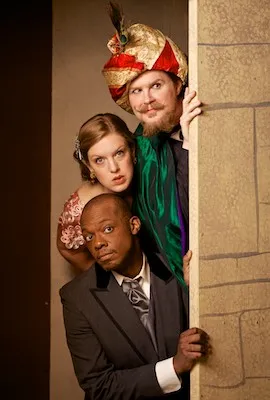
(Photo by Joe Cohn)
It all began on Twelfth Night, 1963. A party was the occasion for the playing of a prized recording of Iolanthe. Two years earlier, on the fiftieth anniversary of the death of Sir William Gilbert, the Savoy Operas entered the public domain under British copyright law and could be produced by any group who so desired. Against this background, Pat Kenan discussed with David Martin and his other guests the artistic merits of Gilbert and Sullivan.
The seed fell on fertile ground for soon word of this enthusiastic conversation reached Ruth Clemens and Ruth Price at Allied Arts. They persuaded the Durham Theater Guild to produce a G&S opera to end their 1963 season. With unbelievable speed, under the direction of Paul Bryan and Bill McIlwinnen, a production of The Pirates of Penzance was rehearsed and presented that May in the Durham High School Auditorium.
The effect was immediate. Lovers of Gilbert and Sullivan appeared from everywhere and seized the opportunity to form a Durham group to present the works of this unique collaboration. In a series of meetings in 1963-64, the group was organized and a constitution was written. After heated debate, the members agreed to call themselves the Durham Savoyards Ltd., a name derived from that of the Savoy Theatre in London, which Richard D’Oyly Carte had built to present his productions of the G&S operettas. (The terms “opera” and “operetta” are technically interchangeable, but the latter is usually preferred when referring to stage works of lighter fare with dialogue interspersed with music and dance.)
As we remember our life in this community, we see ourselves in historical perspective: Gilbert and Sullivan was alive and well in Durham before we came along. There is a record of a Mikado in the 1890s, produced by the Durham Conservatory of Music. In the 1930s, under the sponsorship of W. M. Upchurch, selections from Gilbert and Sullivan were sung between the showings of feature films at Quadrangle Pictures at Duke, directed by J. Foster Barnes. Professor and Mrs. Paul Gross (of the Department of Chemistry at Duke) mounted a Mikado for the Annual Convention of the American Chemical Society (1937) and, during the war years, staged a Pirates and an Iolanthe as benefits for British War Relief. Jake Waggoner led the Temple Baptist Church choir in a production of Trial by Jury. Ken Shepard at St. Joseph’s Episcopal Church organized a Mikado and in 1944, through the Braggtown Baptist Church, a Ruddigore. He called his troupe the Durham Light Opera Company.
The senior American Gilbert and Sullivan society, the Savoy Company of Philadelphia, was established in 1901; we are still a young company in comparison, but from our ranks, workers from the front stage and from the back stage have gone to successes even more remarkable than those they achieved with us. Two are particularly noteworthy: Michael Best, our Frederic in 1963, left us to sing with the Metropolitan Opera Company in New York but came back to join us for our 60th anniversary celebration, and Brenda Hatrill, our set designer in 1969, left us to design sets for the National Theatre Company in London.
Most of us are not so famous, but are no less enthusiastic. Two of us from the original effort in 1963 – Jim Sackett and Carol Kreps Sackett – took part in the 2003 Mikado. Shiangtai Tuan has been a part of every show since 1977. A group of Savoyards were instrumental in the effort to save and restore the historic Carolina Theatre in downtown Durham, where we have been performing our main stage shows since 1996. Over the years we have also put on performances in many other venues, including Thalian Hall in Wilmington, Raleigh Little Theatre, Carrboro ArtsCentre, and decades of performances in Page Auditorium at Duke University.
Now beginning our seventh decade, more than sixty of us have had the glorious honor of being a part of at least one production of each of the thirteen extant G&S operettas. In putting on our shows, we have been clumsy clodhoppers and professional bridesmaids, bucks and blades, jurors, citizens of miscellaneous towns, countries and utopias; we have been ancestors, gondolieri and contadine, gentlemen of Japan, rapturous maidens, school girls, daughters of the plow, peers of peris, daughters, pirates, policemen, and noblemen who have gone wrong; and we’ve even produced a virtual show during a pandemic, all under the proud banner of The Durham Savoyards, Ltd.
– Compiled from various program notes written by George Williams, Phil Becker, and others.